

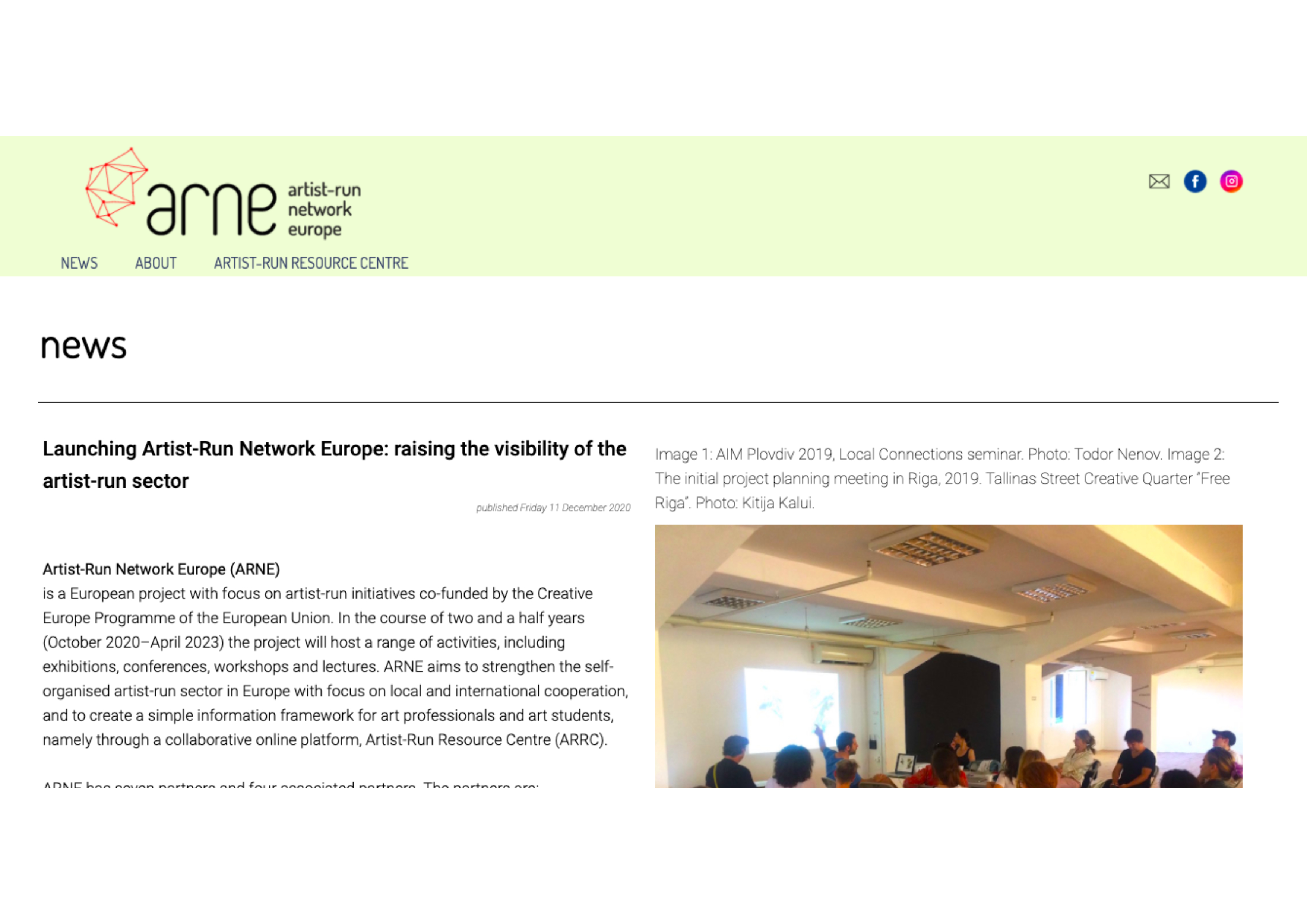
Artist-Run Network Europe
First on my list is our new friends at Artist-Run Network Europe (ARNE for short which prompts a whole raft of Schwarzenegger quotes in my brain every time I hear it, adding to my delight). ARNE is a European Union-funded project focusing on artist-run initiatives in Europe made up of a group of exciting artist-led projects: Candyland (SE), Ormston House (IE) The Lithuanian Interdisciplinary Artists’ Association (LT), >top (DE), The Syndicate of Creatures (DK), The Alternative Art Guide (NL), Totaldobže (LV), Artist-Run Alliance (DE/IL), Aarhus Centre for Visual Art/Juxtapose Art Fair (DK), Konstfack (SE) & Supermarket Art Fair (SE).
“ARNE aims to strengthen the self-organised artist-run sector in Europe with focus on local and international cooperation, and to create a simple information framework for art professionals and art students, namely through a collaborative online platform, Artist-Run Resource Centre (ARRC)”
As ARNE go onto say in their about page art spaces, particularly artist-run ones, can feel quite intimidating to the general public. A historic problem with AL&SO is the difficulty in producing platforms and spaces that a non-art-sector public feels comfortable visiting. One of ARNE’s key aims is finding ways to bridge the gaps between spaces, institutions, artists, public and academics at different levels and in different locations. The project - as far as I understand - is committed to making European AL&SO more networked and supportive as a collective scene across as many nations as possible. This, to my mind, presents a great opportunity to produce models which can be transferred to other parts of the world (with a little tweaking, of course), building towards more networked, communicative and supportive structures globally.
Talking to Alice Máselníková about the project recently, she was keen to stress the desire to position artist-led as a field that people stay in, not just a stepping stone to big-name institutions. This is something that resonated with me, mirroring a desire I have for more flattened cultural ecologies where big institution acknowledges and learns from AL&SO rather than just poaching from it or using it as free labour. The initiation of ARRC also can only help to support the development of practice, stability and confidence in AL&SO initiatives and is a similar idea to our Resources section here at Ephemeral Care (the two platforms hopefully will do some collaborating and cross-pollinating).
ARNE is 18 months into a 3-year research grant and is not too far away from launching major elements of their ongoing platforms and research. Not least of these is the Artist-run: practice and theory course led by Alice Máselníková and Andreas Ribbung which is running this summer at Konstfack. Look out for some more info about that here on Ephemeral Care next month! In the meantime follow ARNE on the socials and check out the website to find out more about what they are doing. It's a fabulous initiative and one that hopefully can start galvanising pan-European AL&SO communities over the coming years.
ARNE
@artist.run.network.europe
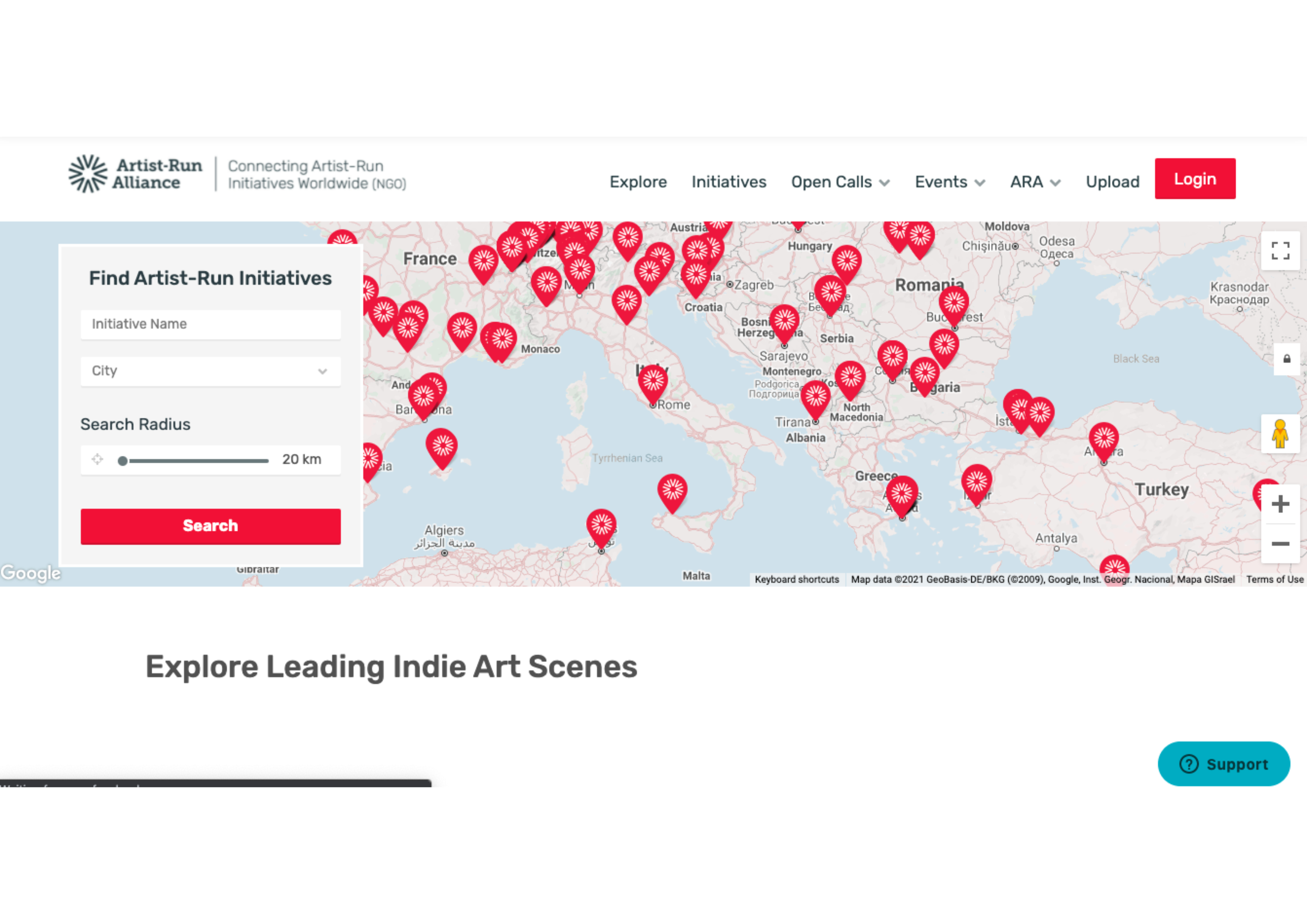
Artist-Run Alliance - Indie Art Guide (and Nottingham Art Map)
Artist-Run Alliance is an associate partner of ARNE which seeks to connect artist-run initiatives. With similar aims as us at Ephemeral Care and ARNE, the platform holds information relating to open calls and opportunities whilst also having the super useful feature of an interactive artist-run map - the Indie Art Guide.
You can simply select a city - say Göteborg, Sweden (since that is where I am) - and set your search area - I went for 20k - and hit go. You are greeted with a list of the independent spaces in the selected radius displayed on a map and with little profiles listed below. Only Galleri BOX comes up for Göteborg, with 3:e Våningen and Grafik i Väst coming up for Gothenburg (confusing in its self that both the English and Swedish versions of the city's name are included). The short description coming shortly is still coming shortly for all three. An issue encountered by many artist map projects is the difficulty in keeping them updated with information about spaces (especially artist-led ones which can be very mobile, ephemeral or transitory) and programmes.
During a seminar in Göteborg about 4 years ago for the publication Practice/Projects/Spaces (part of the research project Artist-Run Europe) a presentation was given by a collective working on a cultural mapping project in the city and wider region. Their main complaint about the exceptionally limited scope of the spaces and projects included and threadbare info was “it's just such a big job calling and emailing all the spaces to find out what they are doing”. My solution then as it still is now is to use the model employed by Tom Godfrey in establishing Nottingham Art Map. Firstly, mapping projects often petter out due to funding only covering the project for 12 months or so. This can easily be solved by connecting to a big well-funded organisation (Nottingham Trent University in Nottingham Art Map's case) that can spare the couple of thousand Euros per year it takes to maintain these projects once the expensive job of designing and producing the platform is done. Secondly, fuck paper - printing is one of the biggest costs associated with these projects and is also the biggest waste of money. The number of paper art maps that get printed picked up, buried in a bag for 6 months and then thrown away must be ridiculous.Nottingham Art Map prints once every 6 months with limited information detailing locations and contact info for the city's art spaces. Other than that, it is all digital. Thirdly - and most importantly - make it the responsibility of the spaces to update their information. They are the ones who want audiences to know what they are doing and to visit them. In the case of AL&SO, they may be working on a very impromptu basis, scheduling shows or events only a few weeks ahead. Giving them the facility to enter information for their own programme takes administrative pressure off the mapping project and also makes these spaces feel more involved. From experience, it takes as long as doing an Instagram post as to update the programme info on Nottingham Art Map. The platform has also presented a fabulous networking drive for the cities creative spaces who previously were a little resistant to collaboration.
Back to Artist-Run Alliance’s Indie Art Guide, I don’t know for sure how they are populating it but as a global platform for mapping independent and AL&SO initiatives, it is super exciting and has a ridiculous amount of potential not only to improve visibility for these spaces to a wider public but also to help these spaces interact and network. It's all just a case of getting everyone aware of it and populating the map with all of the exciting projects going on out there! Go and check out the city you are in on the Artist-Run Alliance Indie Art Guide and see who is and isn’t represented. If folks are missing, let them know about it!
ARA Indie Art Guide
Nottingham Art Map
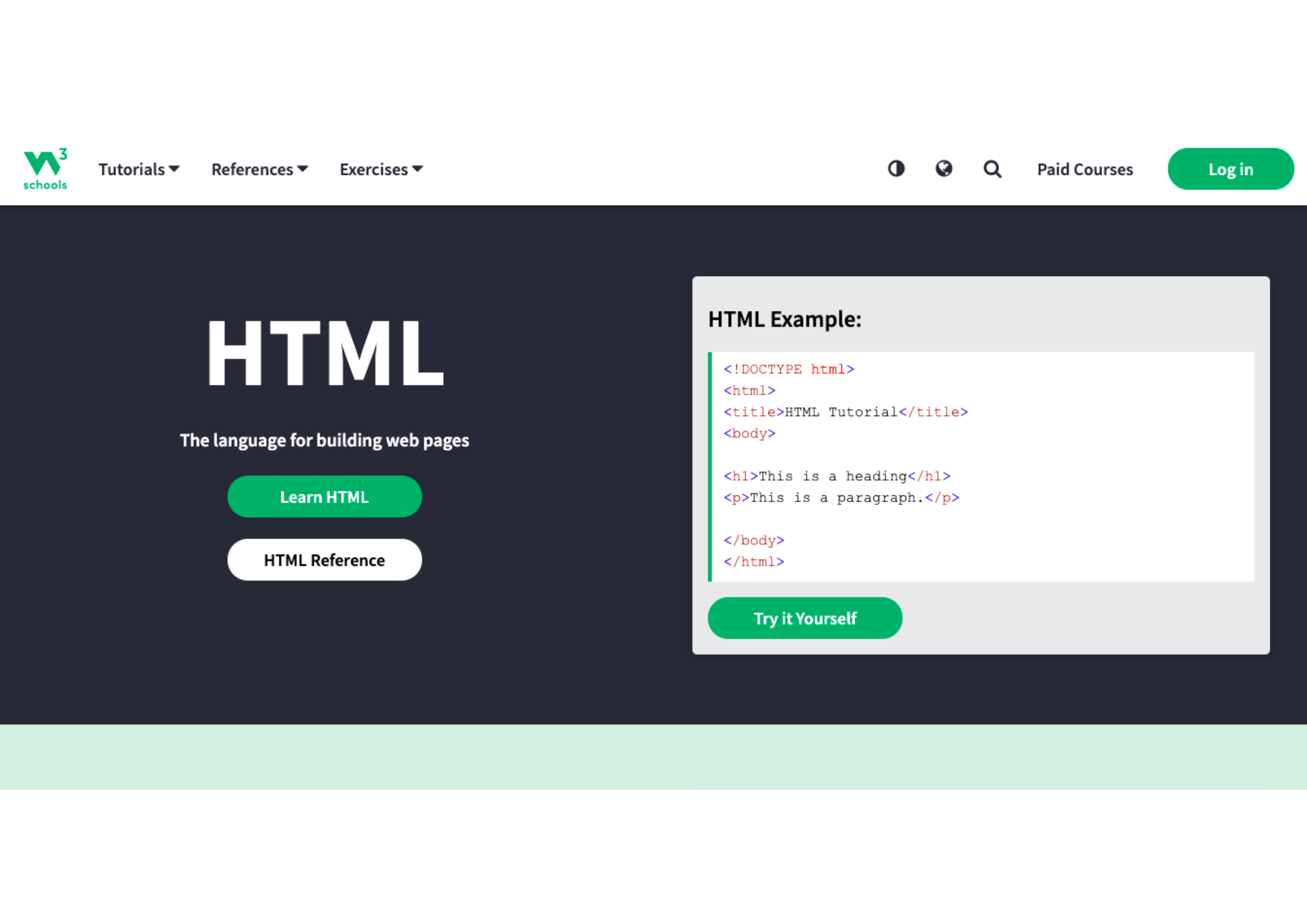
On The Move
This absolutely fantastic platform I discovered just this week and I am super stoked about it. On The Move offers up to date and free-to-access information and guides relating to mobility funds. There are regional and country by country guides to funding streams, both state and private, plus information on amounts, eligibility and application processes.
The guides specifically focus on mobility for artists and arts professionals through grants, residencies and stipends/scholarships aiming to develop global creative networks and promote a more diverse creative ecology. It can seem so intimidating and unachievable as an artist-led space to work internationally let alone with an artist on the other side of the planet. This can lead to local cultural ecologies becoming conceptual and aesthetic echo chambers which aren’t particularly fun or interesting on the whole. A platform like this can provide the tools for an AL&SO gallery space based in Delft to work with an artist collective from Durban, a small collectively run dance festival in Mumbai to bring in performers from Montevideo, or an English curator to travel to Azerbaijan to research local artists.
It limits the relevance of excuses for not increasing the plurality and dynamism of voices in local art scenes and also offers an opportunity and support for people to go and experience first-hand how cultural ecosystems, practices and understandings are in other places. It also provides opportunities for AL&SO initiatives to travel in order to network with comparable organisations in their region with specific information about funding within, for example, the Nordic region (Denmark, Estonia, Finland, Iceland, Latvia, Lithuania, Norway and Sweden). There are even guides for individual countries with funding streams related to local municipalities.
Having all of this information in one place is so useful and so time-saving (and when you're not getting paid, time is money in a big way!). Check it out, start planning some trips for when the pandemic restrictions finally subside. Even if you can’t go physically, make use of that research to expand your network digitally and make connections.
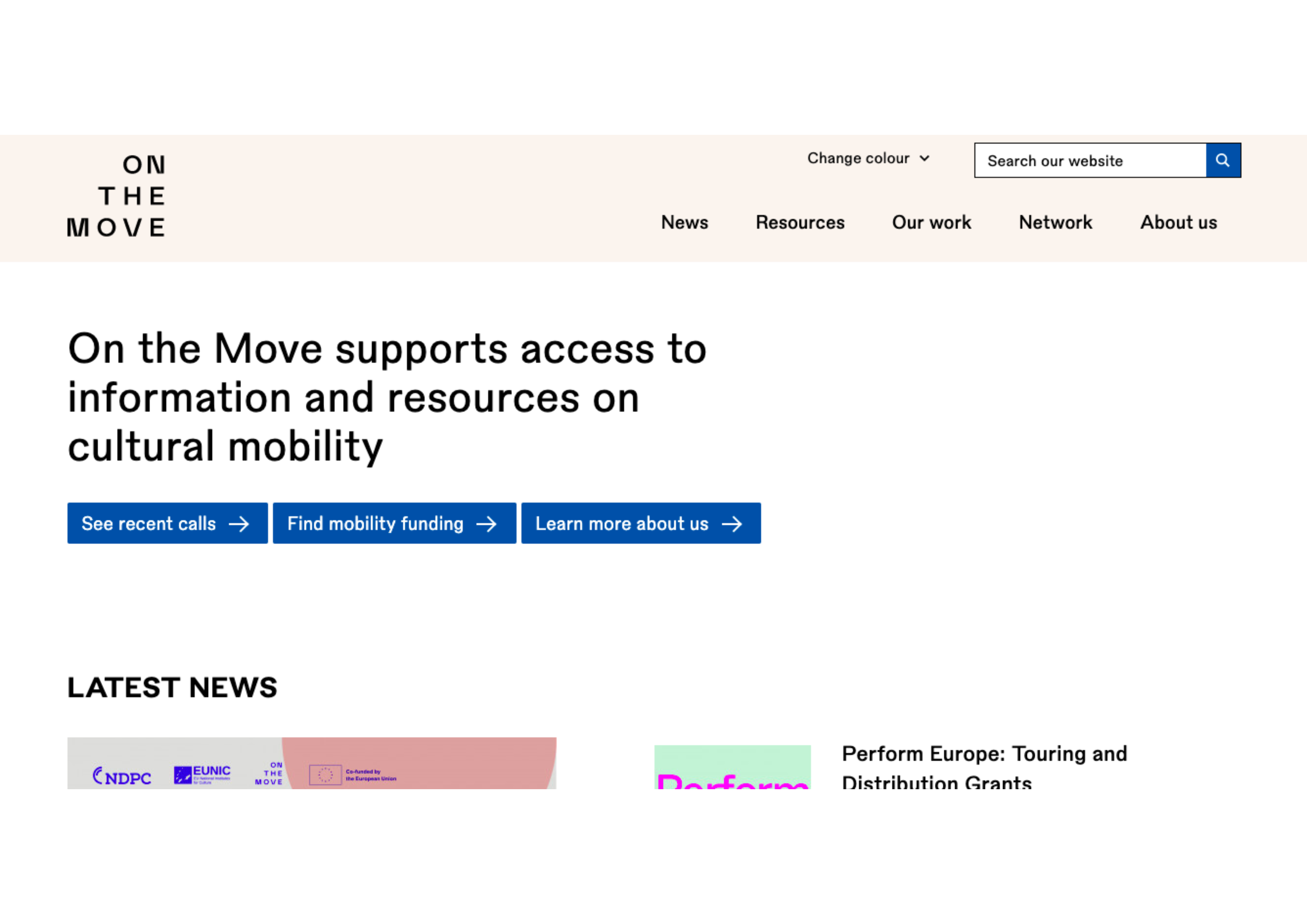
W3Schools
Ok, ok - total transparency I have known about this resource for a long time. This website wouldn’t exist without it. It’s too good not to highlight.
W3Schools is a free to use open-source learning platform dedicated to everything coding. It has super simple guides which take you step-by-step through the labyrinth of coding language from HTML to Java, Bootstrap and beyond. For most simple website stuff you won’t need anything more than HTML, CSS and Java. The guides are really easy to follow and best of all come with a “Try it out” button which allows you to see the code and the results side-by-side which I have found super helpful in understanding where I am going wrong!
Web coding can seem super intimidating and with a bunch of great website builders like WIX and Squarespace around it can seem an unnecessary hassle. However, template-based builders can be limiting and often adding nuance to larger sites for multi-strand projects, research-based practice or even just trying to establish a dynamic and unique web presence can be difficult (and expensive). In many circumstances, it can be more cost-effective and more freeing to go with a hosting company like GoDaddy, do a little homework, and make it yourself. The basic packages offered by hosting services offer much more storage and options than template builders. They also allow options like PHP (which allows you to build databases and have back end input facilities), useful in circumstances where you want user/audience interactions, or want to hold digital residencies for example.
W3Schools also has a whole bunch of templates of its own which you can play around with. These offer a framework that you can mess around with whilst improving your understanding of the formats and languages. Unlike template sites like Squarespace, the W3 templates allow you to interact with the code and are supported by W3 CSS style sheets which you can access, copy and change to make the template truly your own.
The final thing on this totally unsponsored gush about W3Schools is that the platform provides you with a free learning environment where you can effectively develop a new skill set that improves your understanding of digital media, digital curating and presentation processes from a technical standpoint and gives you another possible revenue source to keep a roof over your head and food in your belly.
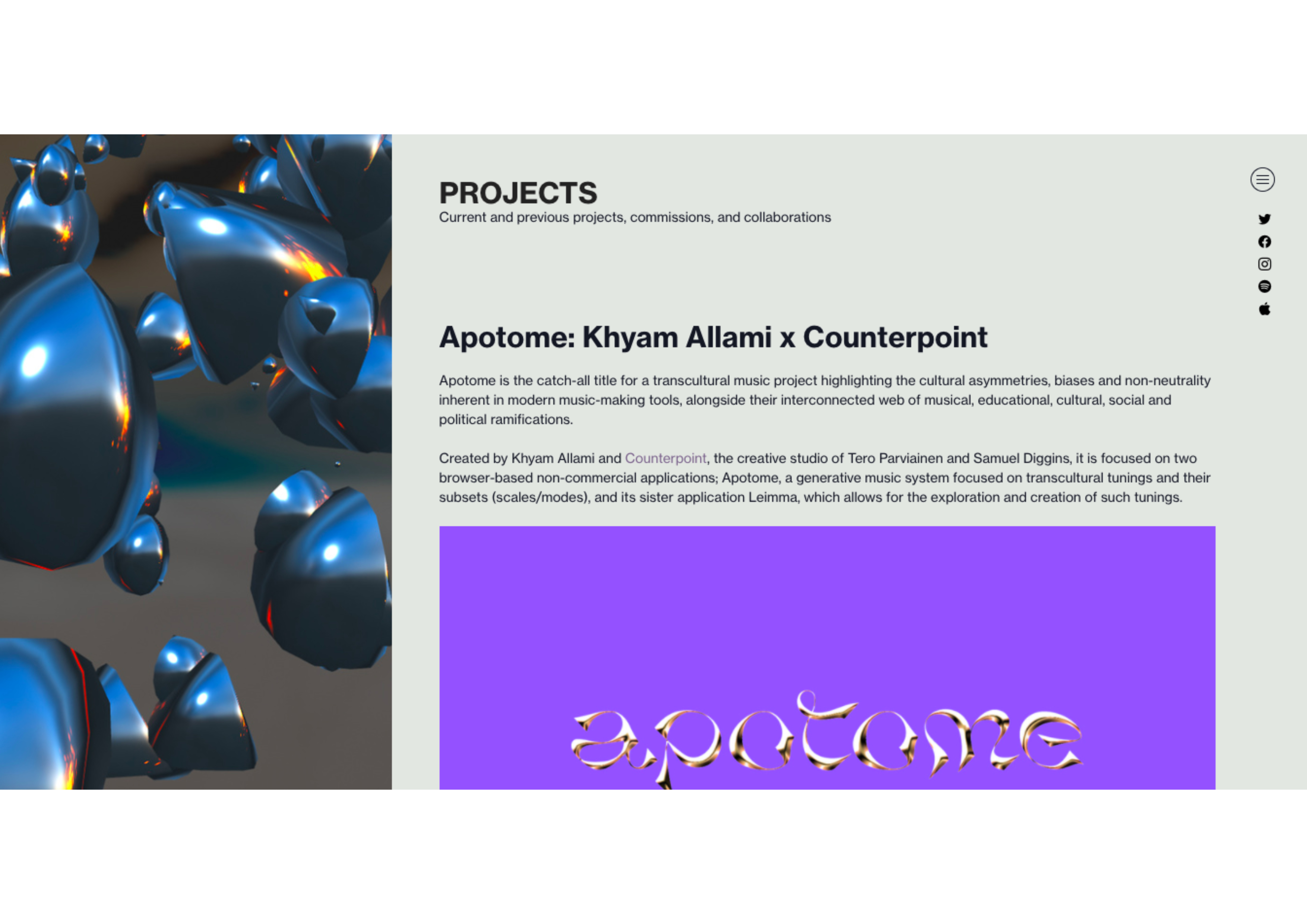
Apotome
I have been introduced to this fascinating research project by Kasra Seyed Alikhani, who is one of the artists for Raumdeuter Radio: Göteborg (launching in September as part of GIBCA Extended in Göteborg, SE). It is something that I felt needed sharing from an awareness perspective, new-exciting-tool perspective and raising an interesting question perspective.
Apotome is an ongoing research project being undertaken by PhD candidate Khyam Allami and Counterpoint (creative studio of Samuel Diggins and Tero Parviainen). To borrow from the project’s website - “Apotome is the catch-all title for a transcultural music project highlighting the cultural asymmetries, biases and non-neutrality inherent in modern music-making tools, alongside their interconnected web of musical, educational, cultural, social and political ramifications.”
Pretty much the whole repertoire of music soft wears on the market operate in the standard western tuning system, something I had not even thought about until Kasra raised it with his proposal for Raumdeuter Radio: Göteborg (exhibiting my white privilege). This biasing to Western musical structures excludes a huge amount of global musical expression and whilst I think you could still produce music in other tuning systems through them it would be exponentially more difficult.
Apotome focuses on realigning focus onto “transcultural tunings and their subsets (scales/modes) whilst its sister application Leimma “allows for the exploration and creation of such tunings.” I am not musically minded, so have a pretty limited understanding of how it works but it seems to interface with midi keyboards and existing audio mixing software whilst providing a huge range of freedom and new avenues into music-making.
Apotome
@khyamallami
Raumdeuter Radio
@raumdeuterradio
RESOURCES
Joe Rowley - June 2021
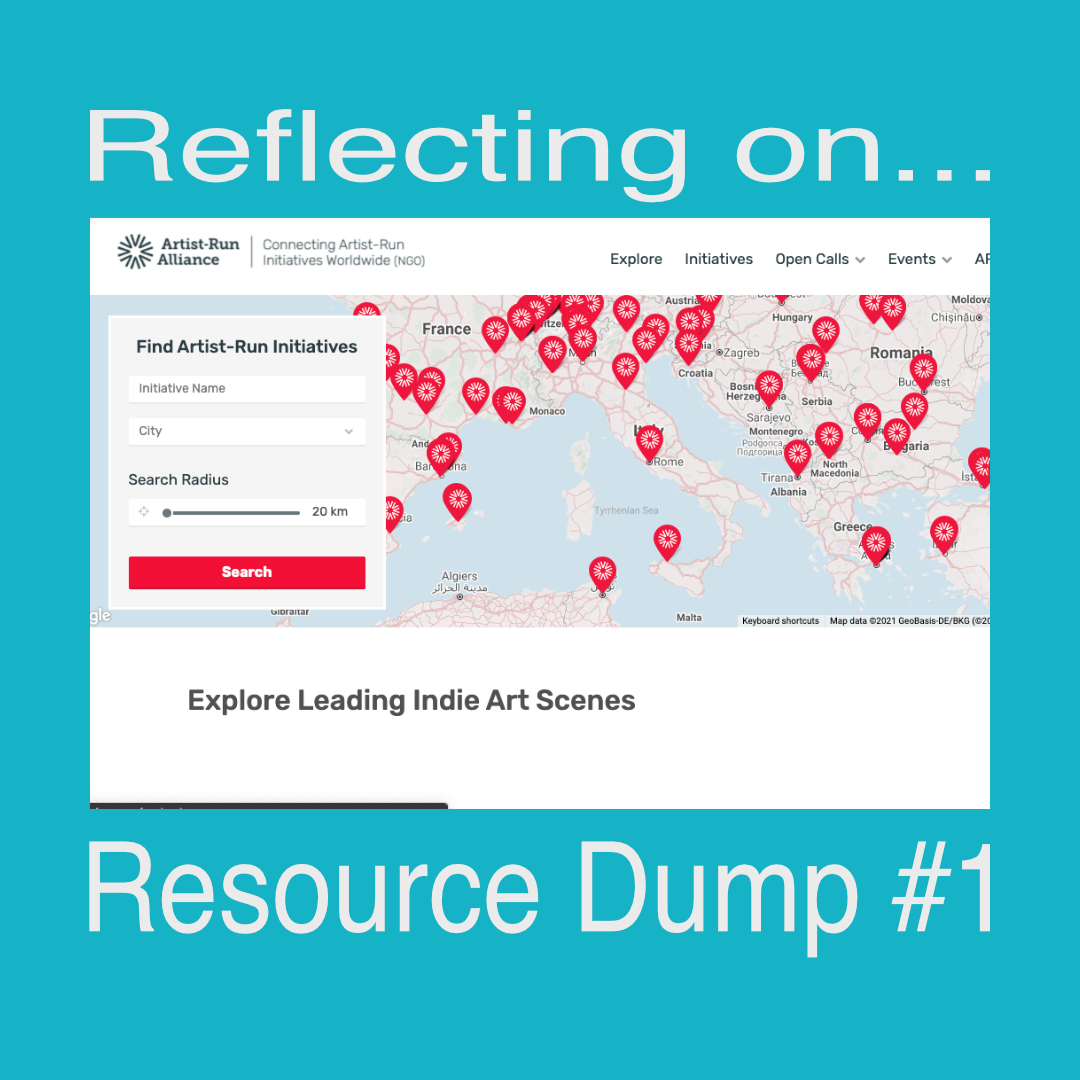
The Reflecting on... series takes situations, objects, artworks, articles, texts, podcasts and anything else really as starting points for reflection on artist-led and self-organised (AL&SO) practice.
Ephemeral Care focuses on ethics, practice and strategies in artist-led and self-organised projects.